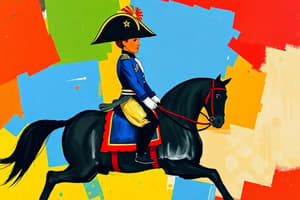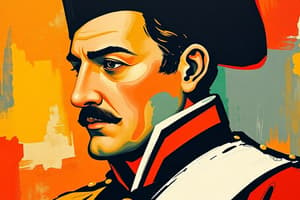Podcast
Questions and Answers
The ______ was the governmental body that took power after the Reign of Terror.
The ______ was the governmental body that took power after the Reign of Terror.
Directory
Napoleon was born in the Italian city of ______.
Napoleon was born in the Italian city of ______.
Corsica
Napoleon was given the nickname "______" for his military leadership.
Napoleon was given the nickname "______" for his military leadership.
Little Corporal
Napoleon’s first major military victory as a French commander took place in ______.
Napoleon’s first major military victory as a French commander took place in ______.
Napoleon described his actions against a mob in Paris as a "______ of grapeshot".
Napoleon described his actions against a mob in Paris as a "______ of grapeshot".
In 1799, Napoleon and his cohorts overthrew the ______ and established a Consul government.
In 1799, Napoleon and his cohorts overthrew the ______ and established a Consul government.
In 1802, Napoleon was appointed 'First Consul for ______'
In 1802, Napoleon was appointed 'First Consul for ______'
Napoleon was crowned Emperor for Life at ______ Cathedral in 1804.
Napoleon was crowned Emperor for Life at ______ Cathedral in 1804.
Napoleon's reforms equalized the tax burden and gave all adult males the right to ______.
Napoleon's reforms equalized the tax burden and gave all adult males the right to ______.
The Cult of ______ was France's first established atheistic religion, intended to replace Catholicism.
The Cult of ______ was France's first established atheistic religion, intended to replace Catholicism.
Napoleon founded the Bank of France in ______ to help the country's economy recover from the French Revolution.
Napoleon founded the Bank of France in ______ to help the country's economy recover from the French Revolution.
The 1804 ______, replaced the laws of pre-revolutionary France, recognizing the principles of civil liberty and equality.
The 1804 ______, replaced the laws of pre-revolutionary France, recognizing the principles of civil liberty and equality.
The name of the international alliance formed by Russia, Austria, and Britain to stand against Napoleon was called the ______.
The name of the international alliance formed by Russia, Austria, and Britain to stand against Napoleon was called the ______.
Napoleon was defeated at ______ in 1815.
Napoleon was defeated at ______ in 1815.
St. Helena is the ______ where Napoleon was exiled after his defeat at Waterloo.
St. Helena is the ______ where Napoleon was exiled after his defeat at Waterloo.
Napoleon Bonaparte died in the year ______.
Napoleon Bonaparte died in the year ______.
The ______ was a collection of 19 mostly German-speaking states part of the Austrian Empire.
The ______ was a collection of 19 mostly German-speaking states part of the Austrian Empire.
Charles X was a French king who abdicated after attempts to ______ the nobles for land lost during the revolution.
Charles X was a French king who abdicated after attempts to ______ the nobles for land lost during the revolution.
The ______ States are a conglomeration of territories on the Italian peninsula under the direct sovereign rule of the Catholic Church.
The ______ States are a conglomeration of territories on the Italian peninsula under the direct sovereign rule of the Catholic Church.
Young ______ was an underground society of Italian men who lobbied and protested in favor of a unified Italy.
Young ______ was an underground society of Italian men who lobbied and protested in favor of a unified Italy.
Giuseppi ______ was the founder of the activist group, Young Italy.
Giuseppi ______ was the founder of the activist group, Young Italy.
Victor Emmanuel II was the King of ______ who supported Italian unification as long as it was under Sardinian rule.
Victor Emmanuel II was the King of ______ who supported Italian unification as long as it was under Sardinian rule.
The ______ Shirts were a pro-unification militia from the southern part of Italy.
The ______ Shirts were a pro-unification militia from the southern part of Italy.
The ______ established a unified kingdom of Italy in 1861.
The ______ established a unified kingdom of Italy in 1861.
Cardinal ______ secretly helped German protestants to weaken the Austrian Empire.
Cardinal ______ secretly helped German protestants to weaken the Austrian Empire.
The ______ of Westphalia was an agreement signed at the end of the Thirty Years’ War.
The ______ of Westphalia was an agreement signed at the end of the Thirty Years’ War.
The ______ Revolt started under Charles X.
The ______ Revolt started under Charles X.
Louis ______ was a French socialist reformer who tried to establish a new republic.
Louis ______ was a French socialist reformer who tried to establish a new republic.
The ______ Republic was formed by socialist reformers to create a more just society.
The ______ Republic was formed by socialist reformers to create a more just society.
The ______ workshops were an attempt to create fair wage jobs for poor workers.
The ______ workshops were an attempt to create fair wage jobs for poor workers.
Louis ______ became Emperor of the French after being elected by popular vote.
Louis ______ became Emperor of the French after being elected by popular vote.
In ______, revolutions erupted throughout the Austrian Empire.
In ______, revolutions erupted throughout the Austrian Empire.
The ______ Palace was built by Czar Peter I in St. Petersburg.
The ______ Palace was built by Czar Peter I in St. Petersburg.
The ______ of Vienna was a series of meetings aimed at establishing a new political order in Europe.
The ______ of Vienna was a series of meetings aimed at establishing a new political order in Europe.
Flashcards
Bourgeoisie
Bourgeoisie
The middle class business and landowners in France who supported Napoleon's rise to power, as they benefited from his policies such as a fair tax system.
The Directory
The Directory
The French governmental body, mostly remnants from the Committee of Public Safety, who controlled the government after the Reign of Terror.
Little Corporal
Little Corporal
The nickname Napoleon received due to his remarkable leadership and military prowess, despite his relatively small stature.
Cult of Reason
Cult of Reason
Signup and view all the flashcards
Toulon
Toulon
Signup and view all the flashcards
1804
1804
Signup and view all the flashcards
Whiff of grapeshot
Whiff of grapeshot
Signup and view all the flashcards
Napoleon's Republican Reforms
Napoleon's Republican Reforms
Signup and view all the flashcards
Egypt
Egypt
Signup and view all the flashcards
1802
1802
Signup and view all the flashcards
Papal States
Papal States
Signup and view all the flashcards
Young Italy
Young Italy
Signup and view all the flashcards
Giuseppe Mazzini
Giuseppe Mazzini
Signup and view all the flashcards
Victor Emmanuel II
Victor Emmanuel II
Signup and view all the flashcards
Red Shirts
Red Shirts
Signup and view all the flashcards
Giuseppe Garibaldi
Giuseppe Garibaldi
Signup and view all the flashcards
Thirty Years' War
Thirty Years' War
Signup and view all the flashcards
Treaty of Westphalia
Treaty of Westphalia
Signup and view all the flashcards
July Revolution
July Revolution
Signup and view all the flashcards
Louis Blanc
Louis Blanc
Signup and view all the flashcards
Second Republic of France
Second Republic of France
Signup and view all the flashcards
National Workshops
National Workshops
Signup and view all the flashcards
Louis Napoleon
Louis Napoleon
Signup and view all the flashcards
Nationalism
Nationalism
Signup and view all the flashcards
Vatican
Vatican
Signup and view all the flashcards
Congress of Vienna
Congress of Vienna
Signup and view all the flashcards
Bank of France
Bank of France
Signup and view all the flashcards
Napoleonic Code
Napoleonic Code
Signup and view all the flashcards
Allies
Allies
Signup and view all the flashcards
Waterloo
Waterloo
Signup and view all the flashcards
St. Helena
St. Helena
Signup and view all the flashcards
Unification
Unification
Signup and view all the flashcards
German Confederation
German Confederation
Signup and view all the flashcards
Carlsbad Decrees
Carlsbad Decrees
Signup and view all the flashcards
Charles X
Charles X
Signup and view all the flashcards
Study Notes
Napoleon's Reign
- The Reign of Terror ended officially in 1794, with Robespierre's beheading.
- The Directory, formed after the Terror, was a revolutionary government.
- Napoleon was born in Corsica to parents of noble blood.
- He was nicknamed "The Little Corporal" for his short stature (5'6").
- Napoleon's first significant military victory was at Toulon.
- He used "whiff of grapeshot" to quell a protest in 1795, earning a promotion to Brigadier General.
- Napoleon's Egyptian campaign was both successful in reforming the government, and disastrous due to British destruction of his fleet.
- During his rule, feudalism and serfdom ended, and civil rights expanded.
- Napoleon made reforms in Egypt.
- He returned to France to a hero's welcome.
- Napoleon's coup overthrew The Directory.
- He became First Consul.
- Napoleon was appointed "First Consul for life" in 1802.
- Napoleon was crowned Emperor for Life in 1804 at Notre Dame Cathedral.
- Napoleon's Republican reforms favored revolutionary goals.
- The Bourgeoisie were Napoleon's biggest supporter class.
- The Cult of Reason was a first established atheistic religion meant to replace Catholicism.
- The Bank of France was founded to revive France's economy following the 1789 Revolution
- The Napoleonic Code of 1804 established principles of civil liberties, equality, and secularism.
European Reaction and Reorganization
- The Congress of Vienna (1814-1815) was an international meeting to restore order after Napoleon's fall.
- The Congress was attended by European state, province, and city representatives.
- The aim was to establish a new order in Europe.
- The goal of the Congress was to establish a new political order.
- A collection of 19 mostly-German speaking states made up the German Confederation.
- Laws limiting free speech were called Carlsbad Decrees.
- King Charles X of France upset the people and abdicated as a result of protests.
- Louis Blanc advocated for France's Second Republic to create fair jobs for the poor.
- The National Workshops were intended to provide those jobs but were unsuccessful.
- Louis Napoleon was elected as Emperor of France.
- In 1848 revolutions erupted throughout the Austrian Empire.
- Alsace and Lorraine were seized by Prussia after they defeated the French.
- The Romanovs were the ruling dynasty of Russia.
- Peterhof Palace was a grand palace in St. Petersburg.
Unification in Italy and Germany
- Nationalism was a movement of pride in one's nation and wanting it to succeed.
- The Vatican was the seat of the Catholic Church.
- The Papal States were under the direct rule of the Catholic Church.
- Young Italy was a secret society committed to Italian unification led by Giuseppi Mazzini.
- Victor Emmanuel II was King of Sardinia.
- The Red Shirts were a pro-unification militia.
- Giuseppi Garibaldi led the Red Shirts.
- Religious divisions caused conflict between protestant and Catholic states.
- Cardinal Richelieu secretly helped Protestant's weaken Austria.
- The Thirty Years War was a war between Catholic vs Protestant states in Germany.
- The Treaty of Westphalia ended the Thirty Years War.
- Otto von Bismarck was a Prussian foreign minister who helped unify Germany.
- Bismarck's philosophy was called "blood and iron".
- Realpolitik means the ends justify the means.
- The Seven Weeks' War was a war in which Prussia crushed Austria.
- German unification occurred in 1871.
- Italian unification occurred in 1861.
Studying That Suits You
Use AI to generate personalized quizzes and flashcards to suit your learning preferences.




